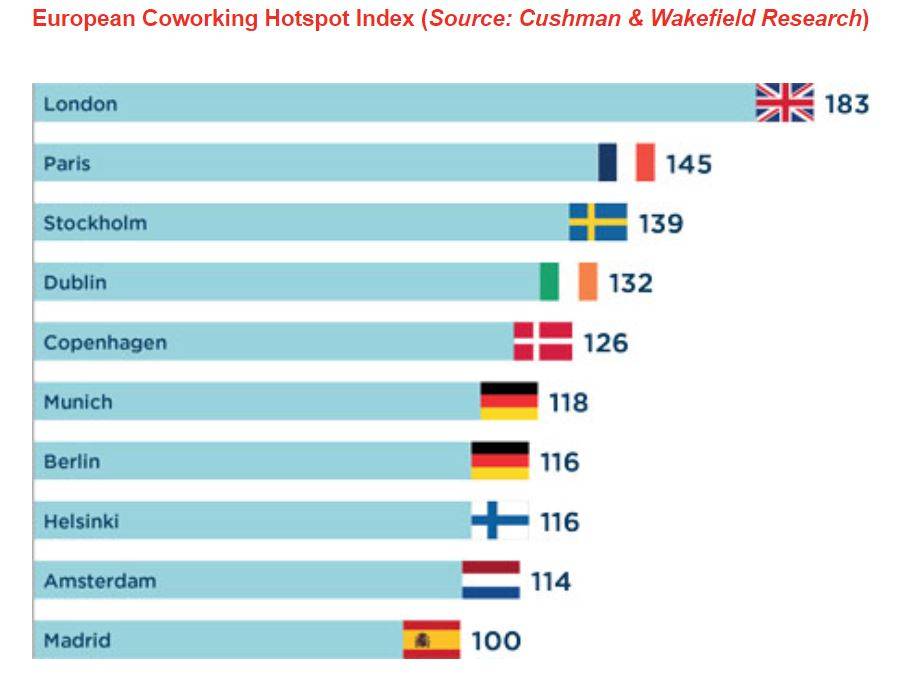April 3, 2019
London, Paris and Stockholm lead ranks of European coworking hotspots
 London, Paris and Stockholm are among the major cities featured in a new research report from Cushman & Wakefield (registration) into the coworking and flexible office sectors, which pinpoints future demand and the next likely growth hotspots across Europe. According to the report, coworking’s rapid expansion in recent years has quickly disrupted global office markets. The report charts the current state of the sector, the emergence of flexible working space across continental Europe and where future growth will occur.
London, Paris and Stockholm are among the major cities featured in a new research report from Cushman & Wakefield (registration) into the coworking and flexible office sectors, which pinpoints future demand and the next likely growth hotspots across Europe. According to the report, coworking’s rapid expansion in recent years has quickly disrupted global office markets. The report charts the current state of the sector, the emergence of flexible working space across continental Europe and where future growth will occur.
Cushman & Wakefield currently tracks 11 million square metres of coworking space, serviced offices and flexible workspace providing a critical insight into the sector. London is the most active city with the largest total coworking stock (1.1 million sqm) in Europe, accounting for 4.6 percent of the overall office market. Indeed, London and New York account for 22 percent of all global coworking stock.
Where next?
 However, the report also looks at where the model might expand next across the continent and which cities display the right combination of factors to support the move away from traditional leasing models to coworking.
However, the report also looks at where the model might expand next across the continent and which cities display the right combination of factors to support the move away from traditional leasing models to coworking.
Cushman & Wakefield’s EMEA Research & Insight team has for the first time compiled a proprietary European Coworking Hotspot Index of 10 key markets. More than 40 cities were initially analysed and ‘scored’ using quantifiable real estate and economic measures which have supported the growth of the flexible working segment covering scale, business environment, people and catalyst factors.
[perfectpullquote align=”left” bordertop=”false” cite=”” link=”” color=”” class=”” size=””]Cities such as Stockholm and Dublin score highly and have great future coworking prospects[/perfectpullquote]
Established office markets such as London and Paris feature prominently at the top but the list also shows that cities such as Stockholm and Dublin score highly and have great future coworking prospects. These factors mean operators and landlords can be more informed as to what offer is most likely to succeed in these cities in the future.
The report also states that many other cities across Europe, which fall outside the top 10 of the index, could nonetheless emerge as interesting locations for flexible office solutions. In fact, in many of these cities, strong growth is already seen in the serviced and managed office offer, reflecting demand from more traditional corporate tenants looking for flexible leasing solutions.
A twist in the market
Report author Elisabeth Troni, Cushman & Wakefield’s Head of EMEA Research & Insight, said: “Our European Coworking Hotspot Index adds a twist to the traditional office market hierarchy and shows the disruptive potential of this fast-emerging sector. However, coworking growth potential also reveals a wide range of dynamic factors underlying a city’s office market. In particular, the growth in coworking represents a clear shift in employment towards digital and technology-based sectors and away from traditional financial services.
[perfectpullquote align=”right” bordertop=”false” cite=”” link=”” color=”” class=”” size=””]The new growth sectors of the digital economy are more nimble – and comfortable with flexible working practices[/perfectpullquote]
“The new growth sectors of the digital economy are more nimble – and comfortable with flexible working practices. This change in tenant preferences for flexible working is shifting the balance of power towards the tenant as the landlord looks to adjust and adapt their strategies in response. With a better understanding of city-level demand drivers for coworking, operators and landlords can be more informed as to which type of workplace offer is most likely to succeed in cities across Europe.
“Our analysis shows every city is different. We expect demand for coworking to be strong in our featured hotspot markets and would recommend that coworking operators and office landlords and investors alike adopt a proactive strategy to managing their response to these dynamics.”













